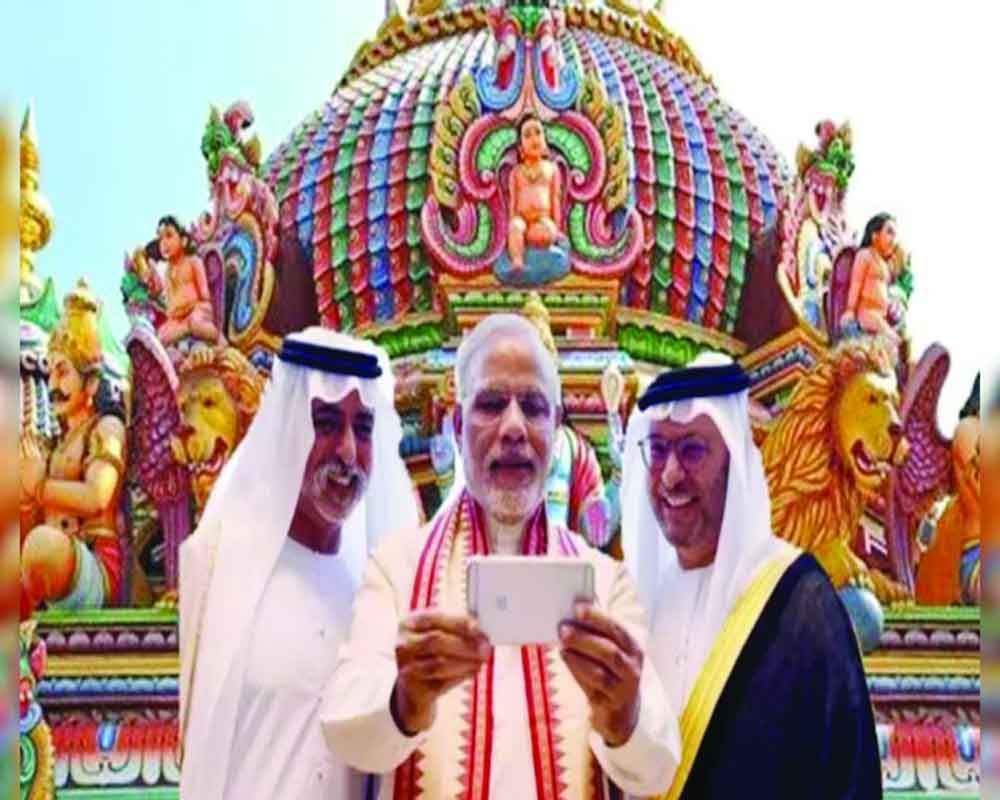India is strategically positioning itself on the global stage, leveraging soft power elements to deepen diplomatic ties and foster regional stability
In today's geopolitical landscape, the traditional metrics of national power are transforming. Policymakers and diplomats are increasingly recognizing the importance of soft power elements in shaping international relations, shifting their focus from sheer military might to cultural influence and moral authority. India, in particular, has adeptly utilized its cultural assets to assert itself on the global stage.
Religion plays a crucial role in shaping politics. As Niall Ferguson has said, “Faith, then, is perhaps as important a component of power as material resources... Faith cannot move mountains. But it can move people.” A recent exemplification of India's strategic cultural diplomacy was witnessed in the inauguration of the first Hindu temple in the UAE, presided over by Prime Minister Narendra Modi. It marked a significant milestone in bilateral relations between the two countries. With the inauguration ceremony of the Bochasanwasi Akshar Purushottam Swaminarayan (BAPS) Mandir, India is set to deepen bilateral ties with the UAE while also having proactive engagement within the region. This event demonstrates a diplomatic approach that, while rooted in faith, culture, and religion, aims to foster cooperation across a spectrum of critical areas, including security, energy, maritime affairs, and infrastructure.
The discussions held during the visit focused on enhancing cooperation in various fields, including trade, investment, and security.
This isn’t the only instance that indicates the changing diplomacy of India with the Gulf. In a triumph for India’s diplomatic endeavours, Qatar released eight Indian nationals who had been detained since 2022. The release came after extensive diplomatic efforts by the Indian government, highlighting the effectiveness of India's diplomatic channels in securing the freedom of its citizens abroad. Through meticulous negotiation and strategic dialogue, our government has once again proven its dedication to protecting the interests of every Indian, no matter where they may be in the world. India's historical and close relations with Qatar were also reiterated by Prime Minister Modi ahead of his visit to Doha. The strong bonds of diplomatic engagement have aided in fostering mutually beneficial partnerships and enhancing regional stability.
These diplomacy initiatives by Narendra Modi are not only events to establish closer ties with the Gulf leaders but also strategic plans to accelerate the economic growth of India. India, with long-term economic cooperation with the Middle Least, can leverage the Gulf's capital potential while aiding them with defence cooperation.
India's cultural diplomacy extends beyond the realm of Hinduism, as evidenced by the Buddhist Circuit, aimed at revitalizing Buddhist heritage sites and boosting tourism in the region.
This pilgrimage circuit, introduced under the Swadesh Darshan Scheme, covers the four major sacred places according to Buddhist traditions, namely Bodh Gaya, Sarnath, Kushinagar, and Lumbini. It is one of India’s first transnational tourist circuits. Beginning from the place of birth of Buddha, Lumbini in Nepal, it serves as an initiative of Buddhist Diplomacy (strengthening a nation’s soft power with the exchanges of Buddhist ideas, sacred objects and trading relations). Invoking the cultural linkages with the region and the religion of Buddhism, India seeks to overcome the territorial tensions between the two nations by fostering a positive people-to-people tie across the border.
Prime Minister Narendra Modi has strategically leveraged Buddhist heritage as cultural assets to strengthen ties with Asian countries. During the Global Buddhist Summit in April 2023, Modi said that the challenges faced by the modern world can be solved by employing the teachings of Buddha. Through his Act East Policy, India has upgraded its strategic relationship with the major countries in the Asia-Pacific while using Buddhism as the cultural link between India and the Southeast Asian countries.
Exploring its historical ties to Buddhism, India is not only preserving its cultural legacy but also strengthening its soft power and attracting visitors from around the world. Through these initiatives, India can bolster its image as a flagbearer of ancient civilizations and traditions. Moreover, ventures like these also contribute towards economic development through tourism. India is trying to create a greater affinity towards Asian countries while projecting itself as a model of religious tolerance, pluralism and a responsible global nation.
Speaking of being a responsible global stakeholder, take for instance our commitment to humanitarian assistance. The recent incident in which the Indian Navy in swift response to the Houthi strike on the merchant ship in the Gulf of Aden, sent the missile destroyer INS Vishakhapatnam shows India’s role as a responsible maritime player. Indian diplomacy extends beyond the realm of culture, encompassing strategic engagements and humanitarian efforts. By providing timely humanitarian assistance, India reaffirms its commitment to upholding peace and stability during crises in the international arena.
In the realm of diplomacy, every gesture and every interaction holds the power to shape bilateral relations and forge alliances. India's assertive stance in leveraging cultural and public diplomacy reflects its growing influence and engagement on the global stage. Through proactive engagement and strategic partnerships, India continues to strengthen its position as a key player in international affairs, contributing to regional stability and global cooperation.
(The writer is an associate professor, views are personal)


























